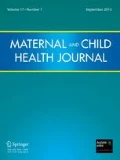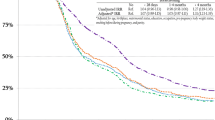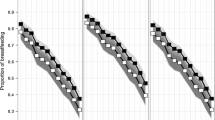Abstract
In 2005, Scotland became the first nation to make breastfeeding in public a legal right, but current breastfeeding targets and maternity leave allowance do not acknowledge the conflicting demands women face when juggling employment and motherhood. This paper explores how employment and maternity leave relate to breastfeeding duration among mothers in Scotland. The Growing Up in Scotland national longitudinal cohort study of 5,217 babies born in 2004–2005 was used. Multivariate proportional hazards regression models were specified using one cross-sectional wave of data to predict breastfeeding duration. Mothers working as employees, full-time (Hazard Ratio 1.6) or part-time (HR1.3), had a higher risk of earlier breastfeeding cessation than non-working mothers. However, self-employed mothers did not differ significantly from non-working mothers in their breastfeeding patterns. Mothers who took longer maternity leave breastfed for longer. The relationships between employment, maternity leave and breastfeeding duration were significant when controlling for known predictors of breastfeeding. Younger mothers, those with less formal education, single mothers, those of white ethnic background, and first-time mothers were more likely to stop breastfeeding sooner, as has been noted in previous research. Employment and early return to work are both factors associated with a shorter duration of breastfeeding. More flexible working conditions and more generous employment leave could help to prolong breastfeeding among working mothers. Current health and employment policy in Scotland and the UK could be better coordinated so that working mothers have the adequate support to meet the conflicting demands of employment and motherhood.
Similar content being viewed by others
References
Wilson, A. C., et al. (1998). Relation of infant diet to childhood health: Seven-year follow-up of cohort of children in Dundee infant feeding study. BMJ, 316, 21–25.
Fewtrell, M. S. (2004). The long term benefits of having been breastfed. Current Paediatrics, 14, 97–103.
Howie, P. W., et al. (1990). Protective effects of breastfeeding against infection. BMJ, 300, 11–16.
Sadauskaite-Kuenhne, V., et al. (2004). Longer breastfeeding is an independent protective factor against development of type 1 diabetes mellitus in childhood. Diabetes/Metabolism Research and Reviews, 20, 150–157.
European Commission. (2004). EU project on promotion of breastfeeding in Europe. Protection, promotion and support of breastfeeding in Europe: A blueprint for action. In: EU conference on promotion of breastfeeding in Europe; 2004; Dublin: European Commission.
The Scottish Parliament. (2005) Breastfeeding etc. (Scotland) Act 2005. 2005 asp 1. Accessed June 2010. http://www.scottish.parliament.uk/business/bills/15-breastfeeding/index.htm.
Scottish Government. (2008). Healthy eating, active living: An action plan to improve diet, increase physical activity and tackle obesity (2008–2011): Scottish Government.
HM Revenue Customs Website—Statutory Maternity Pay. Accessed June 2010. http://www.hmrc.gov.uk/paye/employees/statutory-pay/smp-overview.htm.
Steven, H., et al. (2003). Welfare work requirements and child well-being: Evidence from the effects on breast-feeding. Demography, 40(3), 479–497.
Cooklin, A. R., et al. (2008). Maternal employment and breastfeeding: results from the longitudinal study of Australian children. Acta Paediatrica, 97, 620–623.
Hawkins, S. S., et al. (2007). The impact of maternal employment on breast-feeding duration in the UK millennium cohort study. Public Health Nutrition, 10, 891–896.
Guendelman, S., et al. (2009). Juggling work and breastfeeding: Effects of maternity leave and occupational characteristics. Pediatrics, 123, 38–46.
Tolbert Kimbro, R. (2006). On-the-job moms: Work and breastfeeding initiation and duration for a sample of low-income women. Maternal and Child Health Journal, 10, 19–26.
Anderson, S., et al. (2007). Growing up in Scotland: A study following the lives of Scotland’s children. Edinburgh: Scottish Executive Education Department.
Corbett, J. et al. (2007). Growing up in Scotland sweep 1–2005: User guide: Scottish Centre for Social Research.
WHO. (2003). Global infant feeding strategy. Singapore: World Health Organization.
Scottish Office. (1999). Towards a healthier Scotland: A white paper on health. Edinburgh: The Scottish Office.
Kelly, Y. J., & Watt, R. G. (2005). Breast-feeding initiation and exclusive duration a 6 months by social class—results from the Millennium Cohort Study. Public Health Nutrition, 8, 417–421.
Hamlyn, B., et al. (2002). Infant feeding 2000: A survey conducted on behalf of UK Health Departments by BMRB Social Research. London: The Stationary Office.
Jacknowitz, A. (2007). Increasing breastfeeding rates: Do changing demographics explain them? Women’s Health Journal, 17, 84–92.
Rose, D., & O’Reilly, K. (1998). The ESRC review of Government social classifications: Final Report. Swindon: ESRC/ONS.
Dex, S. (2008). Millennium cohort study—Exploration of some distinctive results for Scotland. In: Scottish Government Social Research.
Skafida, V. (2009). The relative importance of social class and maternal education for breast-feeding initiation. Public Health Nutrition, 12, 2285–2292.
Cleves, M., et al. (2008). An Introduction to Survival Analysis Using Stata (2nd ed.). Texas: Stata Press.
Allison, P. D. (2003). Survival analysis using SAS. Cary, NC: SAS Institute Inc.
Menard, S. (1995). Applied logistic regression analysis. In Sage University Paper series on quantitative applications in the Social Sciences. London: Thousand Oaks.
Blum, L. M. (1993). Mothers, babies and breastfeeding in late capitalist America: The shifting contexts of feminist theory. Feminist Studies, 19(2), 291–311.
Wall, G. (2001). Moral constructions of motherhood in breastfeeding discourse. Gender Society, 15, 592–610.
Maher, V. (1992). Breast-feeding in cross-cultural perspective: Paradoxes and proposals. In V. Maher (Ed.), The anthropology of breast-feeding: Natural law or social construct. Oxford: Berg.
Murphey, E. (1999). “Breast is Best”: Infant feeding decisions and maternal deviance. Sociol Health Ill, 21, 187–208.
Murphey, E. (2000). Risk, responsibility, and rhetoric in infant feeding. Journal of Contemporary Ethnography, 29, 291–325.
Blum, L. M. (1999). At the breast: Ideologies of breastfeeding and motherhood in the contemporary United States. Boston: Beacon Press.
Stearns, C. A. (1999). Breastfeeding and the good maternal body. Gender Society, 13, 308–325.
Avishai, O. (2007). Managing the lactating body: The breast-feeding project and priviledged motherhood. Qualitative Sociology, 30, 135–152.
Connel, R. (1987). Gender and power. Cambridge: Polity Press.
Goffman, E. (1968). Stigma: Notes on the management of spoiled identity. London: Penguin.
Costs and benefits of maternity and paternity leave. European Parliament Press Release 6/10/2010. Strasbourg.
Win, N. N. et al. (2006). Breastfeeding duration in mothers who express breast milk: a cohort study. International Breastfeeding Journal, 1(28).
Gatrell, C. J. (2007). Secrets and lies: Breastfeeding and professional paid work. Social Science and Medicine, 65, 394–404.
Kosmala-Anderson, J., & Wallace, L. M. (2006). Breastfeeding works: the role of employers in supporting women who wish to breastfeed and work in four organizations in England. Journal of Public Health, 28, 183–191.
Acknowledgments
I am grateful for the advice provided by Professor Fran Wasoff and Dr Alison Koslowski and for the support of the Scottish Centre for Social Research and the Centre for Research on Families and Relationships. I am also grateful to all the families who took the time to participate in the Growing Up in Scotland survey. This research was made possible by financial support provided by the Economic and Social Research Council and the Scottish Centre for Social Research, grant number PTA-033-2006-00017.
Conflict of Interest
None.
Ethics approval
The Growing Up in Scotland study received ethics approval from: Scotland—A Research Ethics Committee. The current secondary analysis of the data has been approved by the Research Ethics Committee for the School of Social and Political Studies at the University of Edinburgh.
Author information
Authors and Affiliations
Corresponding author
Rights and permissions
About this article
Cite this article
Skafida, V. Juggling Work and Motherhood: The Impact of Employment and Maternity Leave on Breastfeeding Duration: A Survival Analysis on Growing Up in Scotland Data. Matern Child Health J 16, 519–527 (2012). https://doi.org/10.1007/s10995-011-0743-7
Published:
Issue Date:
DOI: https://doi.org/10.1007/s10995-011-0743-7




